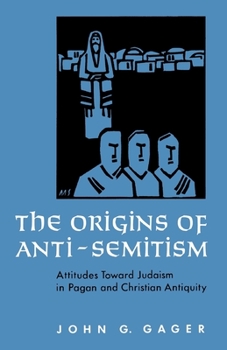The Origins of Anti-Semitism: Attitudes Toward Judaism in Pagan and Christian Antiquity
Select Format
Select Condition 
Book Overview
This revisionist reading of early anti-Judaism offers a richer and more varied picture of the Jews and Christians of antiquity.
Format:Paperback
Language:English
ISBN:0195036077
ISBN13:9780195036077
Release Date:February 1985
Publisher:Oxford University Press
Length:320 Pages
Weight:0.75 lbs.
Dimensions:0.7" x 5.3" x 8.0"
Customer Reviews
1 rating
interesting at the start, dry at the end
Published by Thriftbooks.com User , 15 years ago
This book is divided into three parts, each of which, in my opinion, can be read without reading the other two parts. The first part discusses Roman pagan attitudes towards Judaism - not just the attitudes of kings and politicians, but the attitudes of intellectuals as well. Some pagan writers were anti-Semitic, but others revered Judaism as one of many venerable philosophies. Gager suggests that Jewish prosletyism "exercised a significant influence on Romans", and cites numerous statements by intellectuals implying that their readers knew something about Judaism. For example, the Stoic philosopher Epictetus wrote: "whenever we see a man hesitating between two faiths, we are in the habit of saying, He is not a Jew, he is only acting the part." More interestingly, he writes that anti-Jewish Roman commentary is actually less common after the final crushing of Jerusalem's Jews during the Bar Kochba revolt in 135- perhaps because pagan nationalists felt more threatened by Christianity, since Judaism was no longer a political threat to the Empire. The second part of this book focuses on Judeo-Christian relations. Gager suggests that Christian anti-Semitism is based on Christian fear of "Judaizing" - that is, adoption of Jewish practices by Christians. For example, in 386 John Chrysostom delivered a set of anti-Semitic sermons at the time of Jewish fall festivals such as Yom Kippur, apparently to discourage Christians from celebrating those festivals with Jews. Similarly, in 360 a Council of Laodicea prohibited Christians from resting on Saturdays, and in 341 a Council of Antioch prohibited Christians from celebrating Passover with Jews. Why the hositility? Wrote St Jerome, "if they are allowed to observe [Jewish rites] in the churches of Christ ... they will not become Christians, they will make us Jews." The third, and least readable, part of book discusses the writings of Paul; Gager suggests that according to conventional scholarly wisdom, Paul believed that the Torah could not lead to salvation. But Gager rejects this view, arguing that Paul believed in a kind of "dual salvation" concept- that "Torah remains the path of righteousness for Israel; Christ has become the promised way of righteousness for Gentiles." Because Gager's discussion relies so heavily on New Testament citations, it is less interesting for a layperson than the first two parts.






